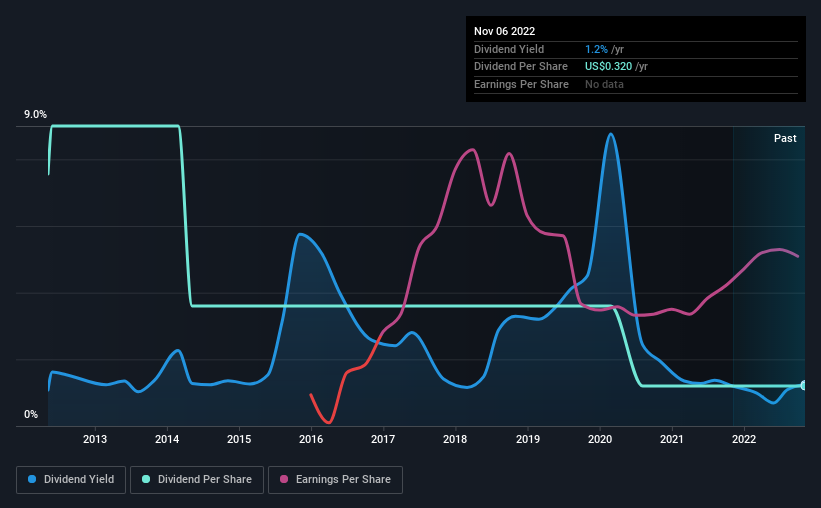
The board of Valhi, Inc. (NYSE:VHI) has announced that it will pay a dividend on the 22nd of December, with investors receiving $0.08 per share. This means the annual payment will be 1.2% of the current stock price, which is lower than the industry average.
While the dividend yield is important for income investors, it is also important to consider any large share price moves, as this will generally outweigh any gains from distributions. Valhi's stock price has reduced by 37% in the last 3 months, which is not ideal for investors and can explain a sharp increase in the dividend yield.
Check out our latest analysis for Valhi
Valhi's Earnings Easily Cover The Distributions
It would be nice for the yield to be higher, but we should also check if higher levels of dividend payment would be sustainable. Before making this announcement, Valhi was easily earning enough to cover the dividend. This means that most of what the business earns is being used to help it grow.
Unless the company can turn things around, EPS could fall by 6.0% over the next year. Assuming the dividend continues along recent trends, we believe the payout ratio could be 5.4%, which we are pretty comfortable with and we think is feasible on an earnings basis.

Dividend Volatility
The company's dividend history has been marked by instability, with at least one cut in the last 10 years. The dividend has gone from an annual total of $2.02 in 2012 to the most recent total annual payment of $0.32. The dividend has fallen 84% over that period. A company that decreases its dividend over time generally isn't what we are looking for.
Dividend Growth Is Doubtful
Given that the track record hasn't been stellar, we really want to see earnings per share growing over time. It's not great to see that Valhi's earnings per share has fallen at approximately 6.0% per year over the past five years. A modest decline in earnings isn't great, and it makes it quite unlikely that the dividend will grow in the future unless that trend can be reversed.
Our Thoughts On Valhi's Dividend
Overall, we don't think this company makes a great dividend stock, even though the dividend wasn't cut this year. The company is generating plenty of cash, which could maintain the dividend for a while, but the track record hasn't been great. We would probably look elsewhere for an income investment.
Investors generally tend to favour companies with a consistent, stable dividend policy as opposed to those operating an irregular one. Still, investors need to consider a host of other factors, apart from dividend payments, when analysing a company. As an example, we've identified 1 warning sign for Valhi that you should be aware of before investing. Is Valhi not quite the opportunity you were looking for? Why not check out our selection of top dividend stocks.
New: Manage All Your Stock Portfolios in One Place
We've created the ultimate portfolio companion for stock investors, and it's free.
• Connect an unlimited number of Portfolios and see your total in one currency
• Be alerted to new Warning Signs or Risks via email or mobile
• Track the Fair Value of your stocks
Have feedback on this article? Concerned about the content? Get in touch with us directly. Alternatively, email editorial-team (at) simplywallst.com.
This article by Simply Wall St is general in nature. We provide commentary based on historical data and analyst forecasts only using an unbiased methodology and our articles are not intended to be financial advice. It does not constitute a recommendation to buy or sell any stock, and does not take account of your objectives, or your financial situation. We aim to bring you long-term focused analysis driven by fundamental data. Note that our analysis may not factor in the latest price-sensitive company announcements or qualitative material. Simply Wall St has no position in any stocks mentioned.
About NYSE:VHI
Valhi
Engages in the chemicals, component products, and real estate management and development businesses in Europe, North America, the Asia Pacific, and internationally.
Excellent balance sheet second-rate dividend payer.
Market Insights
Community Narratives




